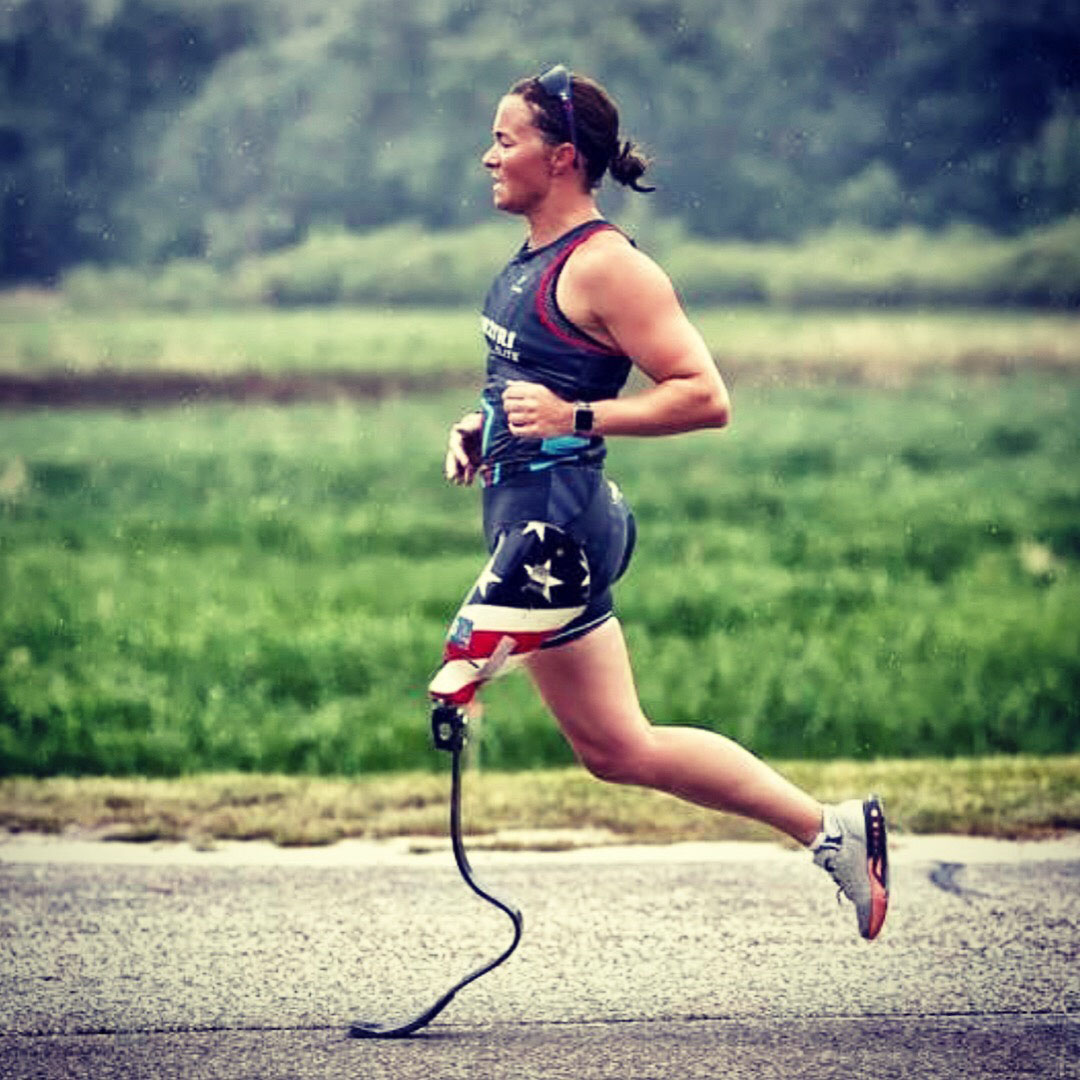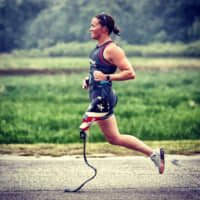Sixty years since the first Paralympic Games in Rome, the athletes are going back to its roots and helping military personnel make their traumatic transition back to postwar life.
Melissa Stockwell, a former U.S. Army officer and two-time Paralympian, continues to share the inspiring story of how she dealt with losing most of her left leg to a roadside bomb during the Iraq War at the age of 24.
After competing in swimming at the Beijing Paralympics in 2008, Stockwell switched to triathlon and won bronze at Rio 2016. Now the mother of two is hoping the 2020 podium will become part of her story of service and triumph over difficulty.
"(My goal is) to make the team and be on the podium," Stockwell said in a recent interview via email. "My teammates Hailey Danz and Allysa Seely are hoping for a repeat of a U.S.A. sweep."
Stockwell, the first American woman to lose a limb in active combat, considers herself lucky to be alive and has refused to let the setback slow her down.
She is one of many military athletes who have improved both their physical and mental quality of life through sports. Adaptive sports were created for this very reason — to provide physical therapy for wounded soldiers in the wake of World War II.
The pinnacle of many adaptive sports is the Paralympics, a version of the Olympics modified to meet the need of athletes with disabilities.
"(I want) to show the world that athletes with disabilities can perform at the highest level alongside Olympic athletes. (I want) to prove that having a disability doesn't have to stop you from doing the things you want to do," Stockwell, 40, said.
"Sports truly gave me my life back after losing my leg, and I think they are incredibly important for anyone, but especially someone who is trying to figure out what they can still do after a traumatic event like losing a limb."
At the Beijing Paralympics, Stockwell became the first Iraq War veteran to ever qualify for the games. Although she walked away without a medal, she was the U.S. flag-bearer for the closing ceremony.
The next time she returned to the Paralympics, she used three different prosthetic legs during the triathlon — one for running, one for swimming and one for biking.
She shared the podium spot with Danz and Seely for the sport's debut when the U.S. completed a clean sweep of the PT2 class.
Stockwell, who received a Purple Heart and a Bronze Star during her stint in the U.S. Army, won triathlon world titles in 2010, 2011 and 2012, and is now training for the 2020 Paralympics in Tokyo. She is one of 240 Olympic and Paralympic hopefuls supported by Toyota Motor Corp. as they push themselves to qualify for Tokyo 2020.
The road to 2020 has been along one.
In 2010, the U.S. Department of Defense organized the Warrior Games as an alternative way to improve recovery and rehabilitation for wounded, ill and injured service members and veterans.
The 2013 Warrior Games in Colorado inspired Britain's Prince Harry to launch the Paralympics-style Invictus Games. The inaugural Invictus Games in London in 2014 saw over 400 competitors from 13 nations compete in front of thousands of spectators.
In November last year, Prince Harry met some of the athletes during a trip to Japan in which he visited the new Nippon Foundation Para Arena in Tokyo.
The Duke of Sussex interacted with wheelchair rugby, powerlifting and boccia athletes and explained how public interest in disabled sports has "just got bigger and bigger" since the Paralympics in London in 2012.
Toshio Yamada, executive director of the Japan Para-Sports Association, said Japan could not compete against Paralympic rivals such as the U.S., Britain and Iran, which have a large number of combat veterans.
But "that is a good thing," he said, adding that the goal of the Paralympics is not gold medals but the well-being of society.
Today, National Paralympic Committees worldwide have re-engaged the link between military rehabilitation and the Paralympic movement that began nearly 70 years ago, in conjunction with their armed forces.
Soldiers injured in conflicts in places like Iraq and Afghanistan are fast-tracked into their national Paralympic training programs after using sports to rehabilitate.
Sports programs for military personnel are spreading because of the rise in soldiers who are wounded but unable to return to active duty, according to Ian Brittain, an internationally recognized expert on Paralympic and disability sports.
"In recent years there has been a resurgence in the use of sport in rehabilitation and recovery process of wounded and ill military personnel in a number of countries around the world," Brittain said in a 2016 report for Coventry University.
Stockwell is just one of many injured veterans and service members who have been able to overcome serious injury or illness and find purpose in life thanks to adaptive sports.
When asked what role Paralympic and adaptive sports play in the lives of injured service members, Stockwell said, "They bring self-worth, self-confidence and the notion that life doesn't have to stop after being injured severely."
Despite being disappointed with her results in 2008, Stockwell doesn't think everyone with challenges similar to hers has to have Paralympic ambitions to turn tragedy into triumph.
"Not everyone that is a person with a disability dreams of becoming a Paralympian, but if they do, the pipeline is in a place to help them start working their way up in hopes of competing on the world's biggest athletic stage."




